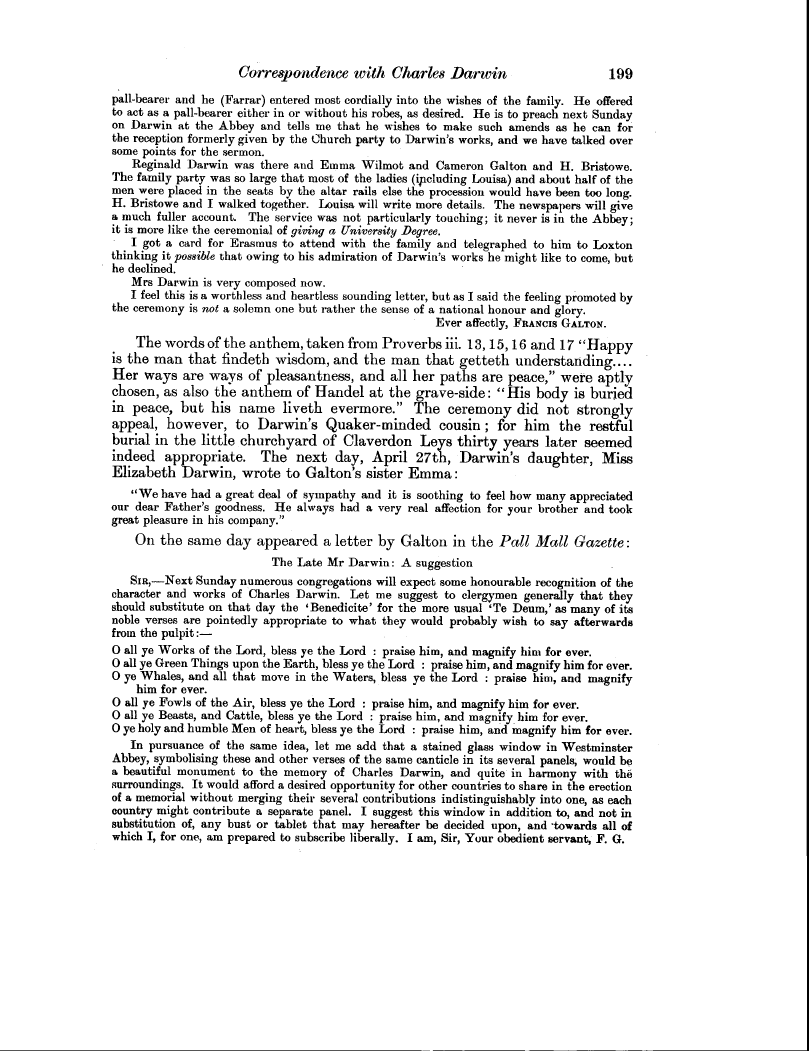Correspondence with Charles Darwin 199
pall-bearer and he (Farrar) entered most cordially into the wishes of the family. He offered to act as a pall-bearer either in or without his robes, as desired. He is to preach next Sunday on Darwin at the Abbey and tells me that he wishes to make such amends as he can for the reception formerly given by the Church party to Darwin's works, and we have talked over some points for the sermon.
Reginald Darwin was there and Emma Wilmot and Cameron Galton and H. Bristowe. The family party was so large that most of the ladies (ipcluding Louisa) and about half of the men were placed in the seats by the altar rails else the procession would have been too long. H. Bristowe and I walked together. Louisa will write more details. The newspapers will give a much fuller account. The service was not particularly touching; it never is in the Abbey; it is more like the ceremonial of giving a University Degree.
I got a card for Erasmus to attend with the family and telegraphed to him to Loxton thinking it possible that owing to his admiration of Darwin's works he might like to come, but he declined.
Mrs Darwin is very composed now.
I feel this is a worthless and heartless sounding letter, but as I said the feeling promoted by the ceremony is not a solemn one but rather the sense of a national honour and glory.
Ever affectly, FRANCIS GALTON.
The words of the anthem, taken from Proverbs iii. 13,15,16 and 17 "Happy is the man that findeth wisdom, and the man that getteth understanding.... Her ways are ways of pleasantness, and all her paths are peace," were aptly chosen, as also the anthem of Handel at the grave-side: "His body is buried in peace, but his name liveth evermore." The ceremony did not strongly appeal, however, to Darwin's Quaker-minded cousin ; for him the restful burial in the little churchyard of Claverdon Leys thirty years later seemed indeed appropriate. The next day, April 27th, Darwin's daughter, Miss Elizabeth Darwin, wrote to Galton's sister Emma
"We have bad a great deal of sympathy and it is soothing to feel how many appreciated our dear Father's goodness. He always had a very real affection for your brother and took great pleasure in his company."
On the same day appeared a letter by Galton in the Pall Mall Gazette
The Late Mr Darwin: A suggestion
SIR,-Next Sunday numerous congregations will expect some honourable recognition of the character and works of Charles Darwin. Let me suggest to clergymen generally that they should substitute on that day the 'Benedicite' for the more usual 'Te Deum,' as many of its noble verses are pointedly appropriate to what they would probably wish to say afterwards from the pulpit:
0 all ye Works of the Lord, bless ye the Lord : praise him, and magnify him for ever.
O all ye Green Things upon the Earth, bless ye the Lord : praise him, and magnify him for ever. O ye Whales, and all that move in the Waters, bless ye the Lord : praise him, and magnify
him for ever.
O all ye Fowls of the Air, bless ye the Lord : praise him, and magnify him for ever.
O all ye Beasts, and Cattle, bless ye the Lord : praise him, and magnify him for ever.
O ye holy and humble Men of heart, bless ye the Lord : praise him, and magnify him for ever.
In pursuance of the same idea, let me add that a stained glass window in Westminster Abbey, symbolising these and other verses of the same canticle in its several panels, would be a beautiful monument to the memory of Charles Darwin, and quite in harmony with the surroundings. It would afford a desired opportunity for other countries to share in the erection of a memorial without merging their several contributions indistinguishably into one, as each country might contribute a separate panel. I suggest this window in addition to, and not in substitution of, any bust or tablet that may hereafter be decided upon, and -towards all of which I, for one, am prepared to subscribe liberally. I am, Sir, Your obedient servant, F. G.

